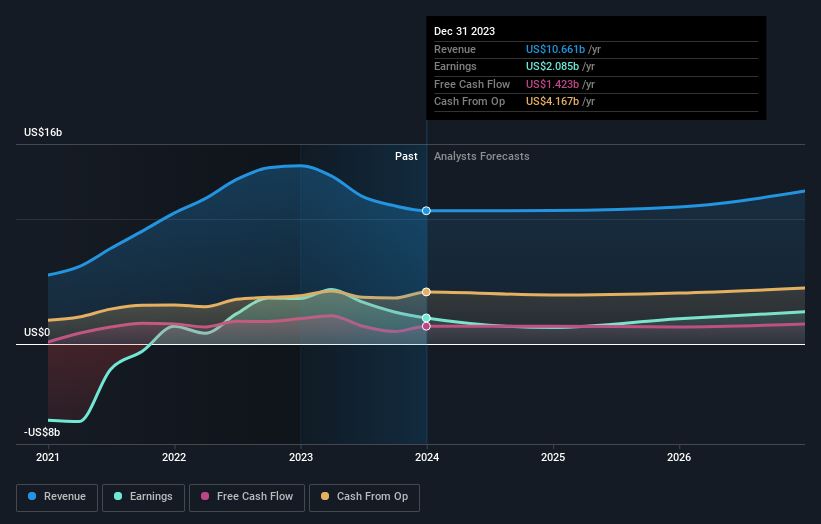Ovintiv Inc. Beat Analyst Estimates: See What The Consensus Is Forecasting For This Year
Investors in Ovintiv Inc. (NYSE:OVV) had a good week, as its shares rose 6.8% to close at US$49.41 following the release of its annual results. It looks like a credible result overall - although revenues of US$11b were in line with what the analysts predicted, Ovintiv surprised by delivering a statutory profit of US$7.90 per share, a notable 13% above expectations. Earnings are an important time for investors, as they can track a company's performance, look at what the analysts are forecasting for next year, and see if there's been a change in sentiment towards the company. We thought readers would find it interesting to see the analysts latest (statutory) post-earnings forecasts for next year.
See our latest analysis for Ovintiv
Taking into account the latest results, Ovintiv's nine analysts currently expect revenues in 2024 to be US$10.7b, approximately in line with the last 12 months. Statutory earnings per share are forecast to plunge 36% to US$4.88 in the same period. In the lead-up to this report, the analysts had been modelling revenues of US$10.8b and earnings per share (EPS) of US$7.23 in 2024. So there's definitely been a decline in sentiment after the latest results, noting the pretty serious reduction to new EPS forecasts.
It might be a surprise to learn that the consensus price target was broadly unchanged at US$54.08, with the analysts clearly implying that the forecast decline in earnings is not expected to have much of an impact on valuation. Fixating on a single price target can be unwise though, since the consensus target is effectively the average of analyst price targets. As a result, some investors like to look at the range of estimates to see if there are any diverging opinions on the company's valuation. Currently, the most bullish analyst values Ovintiv at US$63.00 per share, while the most bearish prices it at US$42.00. There are definitely some different views on the stock, but the range of estimates is not wide enough as to imply that the situation is unforecastable, in our view.
Of course, another way to look at these forecasts is to place them into context against the industry itself. We would highlight that Ovintiv's revenue growth is expected to slow, with the forecast 0.1% annualised growth rate until the end of 2024 being well below the historical 19% p.a. growth over the last five years. Compare this against other companies (with analyst forecasts) in the industry, which are in aggregate expected to see revenue growth of 1.7% annually. Factoring in the forecast slowdown in growth, it seems obvious that Ovintiv is also expected to grow slower than other industry participants.
The Bottom Line
The most important thing to take away is that the analysts downgraded their earnings per share estimates, showing that there has been a clear decline in sentiment following these results. On the plus side, there were no major changes to revenue estimates; although forecasts imply they will perform worse than the wider industry. The consensus price target held steady at US$54.08, with the latest estimates not enough to have an impact on their price targets.
Following on from that line of thought, we think that the long-term prospects of the business are much more relevant than next year's earnings. We have estimates - from multiple Ovintiv analysts - going out to 2026, and you can see them free on our platform here.
That said, it's still necessary to consider the ever-present spectre of investment risk. We've identified 3 warning signs with Ovintiv , and understanding these should be part of your investment process.
Have feedback on this article? Concerned about the content? Get in touch with us directly. Alternatively, email editorial-team (at) simplywallst.com.
This article by Simply Wall St is general in nature. We provide commentary based on historical data and analyst forecasts only using an unbiased methodology and our articles are not intended to be financial advice. It does not constitute a recommendation to buy or sell any stock, and does not take account of your objectives, or your financial situation. We aim to bring you long-term focused analysis driven by fundamental data. Note that our analysis may not factor in the latest price-sensitive company announcements or qualitative material. Simply Wall St has no position in any stocks mentioned.

